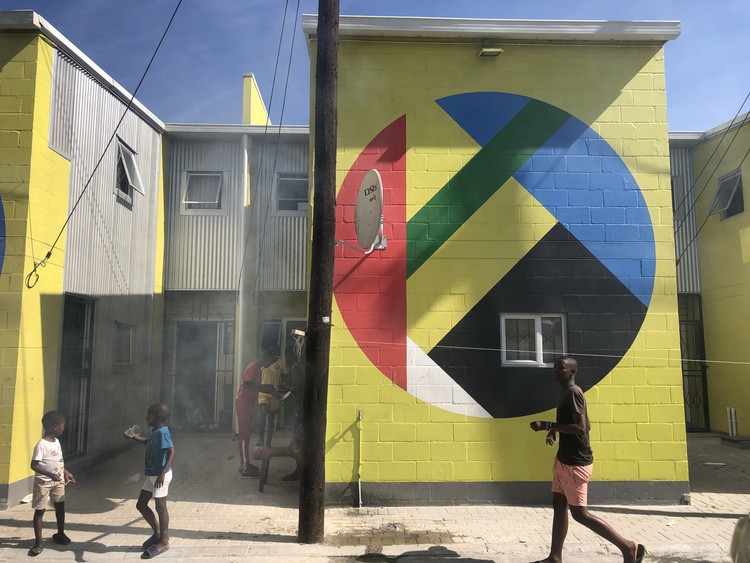
27 November 2024
The project by Swiss-based Urban Think Tank Empower aims to present alternatives to RDP housing. Photos: Mary-Anne Gontsana
An informal settlement with no access to electricity, water and toilets in a Cape Town township has been transformed into brightly-coloured rows of double-storey flats with its own community centre.
Soweto informal settlement in Site C, Khayelitsha was established around 2008 and had 72 shacks with about 500 people living there. The community was approached by a Khayelitsha-based organisation, Ikhayalami, in collaboration with design studio Urban Think Tank Empower (UTTE), years ago to start the project. UTTE is based at the Swiss Institute of Technology in Zurich.
The project is meant to offer alternatives to RDP housing.
Two years ago, GroundUp reported on the “first of its kind” housing project in Site C which was also done by UTTE. There the team worked on about 75 homes as a university research project.
The 72 brightly coloured homes built for the Soweto informal settlement residents are in a different section of Site C. The new homes were built where the shacks had been.
Phumezo Tsibanto, who had lived in the settlement for over a decade, jumped at the opportunity to live in his own house with running water and a toilet.
Tsibanto, who is visually impaired, says having his own house has been amazing. He said though residents had fought for homes and services for years, “we never thought it would actually happen”.
UTTE’s Justine Vlok said the project had taken 10 years and the community had been included “in every step”.
The new community centre in Site C, Khayelitsha.
“Every home is different because each family’s requirements are different. Our double-storey homes range from 36 square metres to 80 square metres according to a family’s needs,” she says.
Vlok says the plan was for the close-knit community to keep relationships intact.
Beneficiaries are expected to contribute between 3% and 5% of the costs depending on the household’s income. Vlok says the smallest flat cost about R293,730 and the largest about R701,690.
The main funder of the housing project, Vlok says, is the VRM Foundation. But they hope to get more funders onboard as they take the project to other communities.
Vlok says they chose to build double-storeys because this left space to create safe areas for children to play and for a community centre with a vegetable garden on top.
At the launch of the project City of Cape Town mayco member for human settlements, Carl Pophaim, said the City is finalising a formal partnership with UTTE to bring more opportunities to those “waiting too long” for dignified housing.
“There are too many communities facing the same challenges. The City is committed to using this example as a blueprint of how we can take it to other communities,” he said.
Beneficiary Madlomo Mpondonkulu said she was initially sceptical about the project and feared that it was a trick to get people to demolish their shacks. But she says clear communication from UTTE team reassured her.
“This project took about ten years and in the meantime we residents had to find alternative accommodation, so it was very stressful, but it was all worth it. Now we have our own homes, with electricity, toilets inside, and it’s safe,” she said. Before getting her house, Mpondonkulu shared a leaking shack with six other relatives.
Vlok said the next project was to build 130 homes in Imizamo Yethu in Hout Bay and rebuild a creche in Hangberg called Little Angels.
There is a vegetable garden situated on top of the community centre in Khayelitsha.